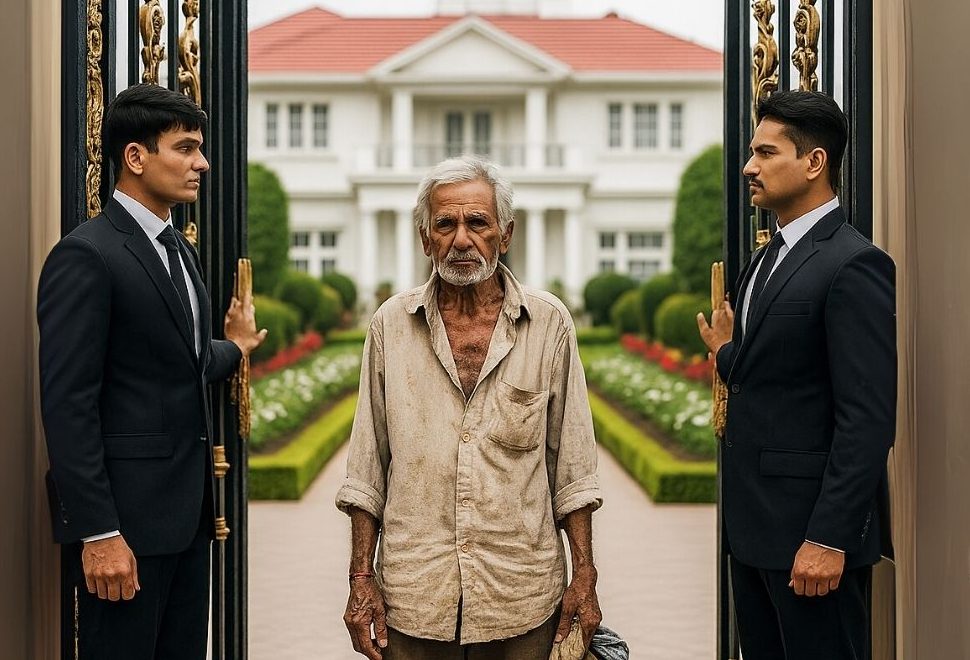On a scorching summer morning in New Delhi, near a grand villa nestled within the city’s elite neighborhood, a man dressed in a construction worker’s attire, his clothes dusted with cement, appeared at the gates.
A worn cloth bag hung from his shoulder, and he gripped a hard hat in his hand. The moment he moved forward, two bodyguards clad in black barred his way.
“Go away! Laborers aren’t employed here,” they sternly commanded.
Without uttering a word, the man reached into his pocket and produced a wrinkled scrap of paper, extending it toward the guards. One of them grabbed it, scanned it briefly, then crushed it disdainfully and threw it onto the ground.
“You expect to meet the Sahib with this? Leave immediately!”
He remained still, fixing his steady gaze at the imposing iron gate, almost as though awaiting someone. After being roughly pushed aside towards the street, he only nodded faintly and murmured:
“I will return in thirty minutes.”
Thirty minutes later, an extravagant celebration was underway inside the villa, honoring Mr. Rajendra Malhotra’s 70th birthday. Mr. Malhotra, the chairman of the renowned Malhotra Group real estate empire, was surrounded by family members, close friends, and buzzing press.
During his speech, the butler hurried in and whispered urgently to Mr. Malhotra. Almost instantly, his face drained of color, his hands trembled, and his voice wavered:
“Where… is he?”
The room grew silent, as attendees were baffled by his sudden change. Dropping everything, Mr. Malhotra swiftly made his way to the main entrance, confusion evident among his family members.
The man confronted him calmly:
“Do you recognize me?” he asked, his voice low and icy cold.
Breathing heavily, Mr. Malhotra remained speechless. The man then produced an old notebook, flipped to a page stained with dried blood. Scrawled on it were the words, “Betrayal is life’s gravest sin,” alongside a name: Rajendra Malhotra.
With quiet resolve, the man revealed:
“Three decades ago, you pushed me off scaffolding, stealing my project and the woman I loved. You presumed I was dead. But I survived, and now I return—not for wealth.”
Mr. Malhotra collapsed to his knees, lips quivering, uttering a name long banned within the family:
“It’s… Ramesh… My younger brother…”
The villa stood frozen in shock. The man, once declared deceased in a workplace accident and erased from all records, was the very worker turned away earlier that morning.
Stepping back, Mr. Ramesh gestured towards a car parked beyond the gate:
“I am not alone. I have come to disclose our mother’s secret will. She sheltered me and now, I claim what is rightfully mine.”
That evening, headlines nationwide were dominated by news of Malhotra Group’s operations freezing amid fierce inheritance disputes. The deceased matriarch’s undisclosed will named the true heir not as Mr. Rajendra, but as the betrayed younger sibling.
Mr. Ramesh—the once-shunned mason—walked away calmly, leaving behind stunned faces of those who had assumed entitlement.
- A man disguised as a laborer reveals a hidden family secret
- Decades-old betrayals come to light at a birthday celebration
- Inheritance dispute shocks a powerful real estate empire
Key Insight: This tale is a powerful reminder that appearances can deceive, and truth has a way of resurfacing, no matter how deeply it is buried.
In conclusion, the story unravels themes of betrayal, survival, and justice, illustrating how hidden truths and resilience ultimately reshape destinies. It teaches us to never judge based on superficial impressions and to acknowledge that time often reveals the most profound revelations.
